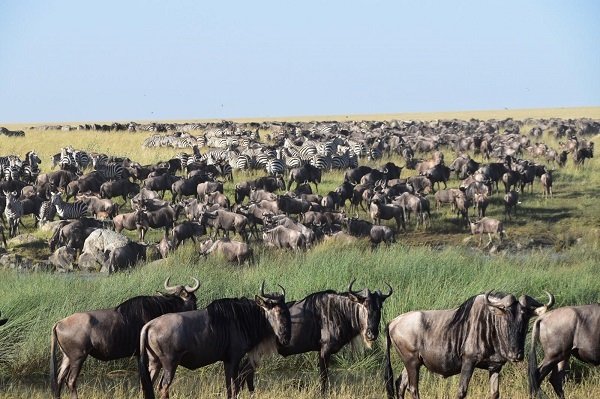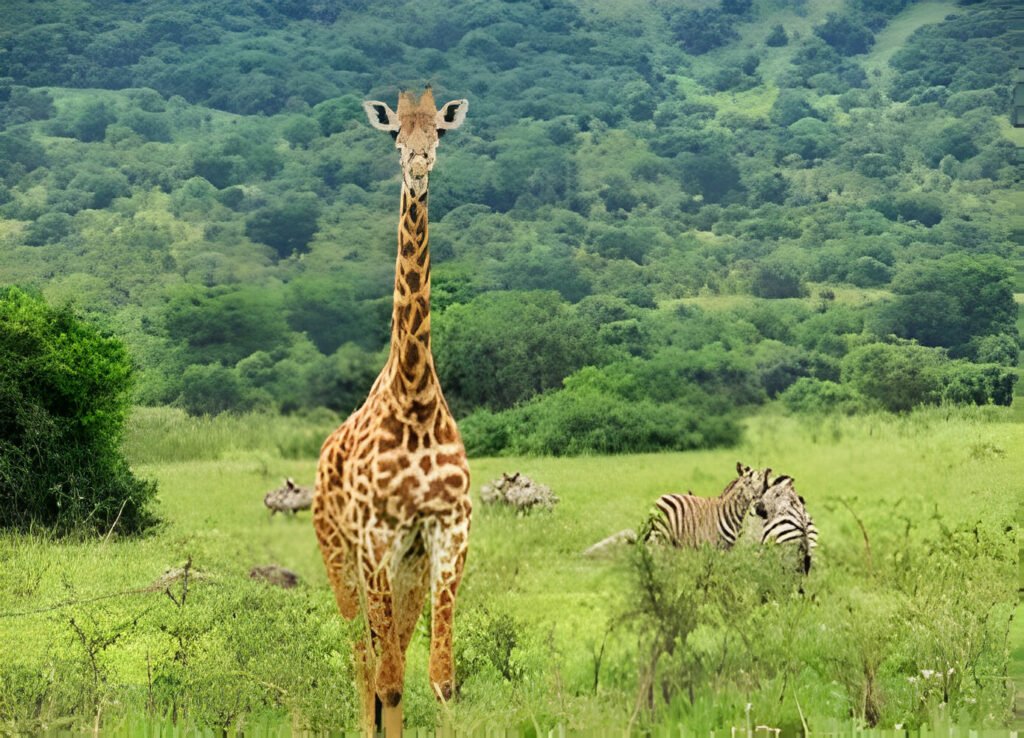Why the Green Season Is the Best Time for a Safari in Tanzania. Serengeti National Park is one of Africa’s most iconic wildlife destinations, known for its vast plains, incredible biodiversity, and famous Great Migration. Located in northern Tanzania, this UNESCO World Heritage Site is home to an astonishing array of animals, offering visitors unforgettable encounters with some of the world’s most majestic creatures. From the Big Five to countless bird species, the Serengeti is a dream destination for any nature lover.

Why the Green Season Is the Best Time for a Safari in Tanzania : The Big Five in the Serengeti
The Serengeti is renowned for its Big Five—the most sought-after animals on safari. These include the lion, leopard, elephant, buffalo, and rhino. Spotting the Big Five is often at the top of visitors’ lists, and the Serengeti offers one of the best chances to see them all in one park.
- Lions: The Serengeti is home to one of the largest lion populations in Africa, with around 3,000 lions roaming the plains. You’ll often find them lounging in the shade of acacia trees or hunting in groups, known as prides.
- Leopards: These elusive cats are best spotted in the central Serengeti, where they climb trees to rest or search for prey. Look for them in the Seronera Valley.
- Elephants: Herds of elephants can be seen across the park, especially in the woodlands. They play a crucial role in shaping the landscape by uprooting trees and clearing pathways.
- Buffalo: Often found in large herds, buffalo are common throughout the park. They are considered one of the most dangerous animals on the continent, particularly when cornered.
- Rhinos: While black rhinos are endangered, there are still a few protected in the park, mostly around the Ngorongoro Crater region.
Learn more about the Big Five safaris at Kilimanjaro Climb Specialist
Why the Green Season Is the Best Time for a Safari in Tanzania : The Great Migration: A Wildlife Spectacle
The Great Migration is one of the most spectacular natural events on Earth, and it happens right in the Serengeti. Each year, over 1.5 million wildebeest, along with zebras and gazelles, migrate across the Serengeti and the Maasai Mara in search of fresh grasslands. This dramatic journey is filled with life-and-death struggles, particularly when the herds cross the Grumeti and Mara Rivers, where crocodiles await.
- Timing: The migration is a year-round event, but the best time to witness the river crossings is from July to October in the northern Serengeti.
- Calving Season: Between January and March, over 500,000 wildebeest calves are born in the southern Serengeti, attracting predators such as lions, cheetahs, and hyenas.
Plan your Great Migration safari with Eddy Tours Safaris
Why the Green Season Is the Best Time for a Safari in Tanzania : Cheetahs: Speed Demons of the Serengeti
The Serengeti is one of the best places in Africa to see cheetahs in action. Known for their incredible speed, these big cats rely on open grasslands to hunt their prey, primarily gazelles. The eastern plains of the Serengeti offer prime cheetah territory, where they can be seen stalking and chasing down prey at speeds of up to 60 mph.
Why the Green Season Is the Best Time for a Safari in Tanzania : Hyenas: Efficient Predators
Often misunderstood, hyenas are key players in the Serengeti’s ecosystem. They are efficient hunters and scavengers, capable of taking down large prey like wildebeest, but they are often associated with scavenging from lion kills. You can hear their iconic “laugh” at night, and they are frequently seen in groups, known as clans, across the park.
Discover more about predators in the Serengeti ecosystem
Giraffes: The Tallest Mammals on Earth
Standing up to 18 feet tall, giraffes are hard to miss in the Serengeti. These gentle giants move gracefully across the savannah, feeding on the leaves of acacia trees. They are often seen in small groups, and their long necks allow them to browse on foliage that other herbivores can’t reach. Giraffes are especially common in the wooded areas of the Serengeti.

Birdlife in the Serengeti: Over 500 Species
The Serengeti is a birdwatcher’s paradise, boasting over 500 bird species. From majestic eagles and vultures to colorful species like the lilac-breasted roller and the superb starling, the diversity is astonishing.
- Ostriches: As the world’s largest birds, ostriches are a common sight in the Serengeti. Their long legs and impressive speed allow them to outrun most predators.
- Secretary Birds: Known for their striking appearance and unique hunting style, these birds are often seen striding across the grasslands looking for snakes and other small animals.
Learn more about birdwatching in the Serengeti
Zebras: Striped Wonders of the Plains
Zebras are a common sight in the Serengeti, often mingling with wildebeest during the migration. Their striking black-and-white stripes make them easy to spot, and each zebra’s pattern is unique, like a fingerprint. While they are social animals that form tight-knit groups, zebras are always on the lookout for predators, particularly lions and hyenas.
Hippos: River Giants
The rivers and waterholes of the Serengeti are home to large populations of hippos. These massive creatures spend most of their day submerged in water to stay cool, coming out at night to graze on grass. While they may seem slow and docile, hippos are actually very dangerous and are responsible for more human fatalities in Africa than most other animals.
Crocodiles: Lurking in the Waters
The Grumeti and Mara Rivers in the Serengeti are home to large populations of Nile crocodiles, some of the biggest reptiles in Africa. These crocodiles lie in wait during the river crossings of the Great Migration, ambushing wildebeest and zebras as they attempt to cross the treacherous waters. Seeing a crocodile in action is one of the most dramatic moments of a Serengeti safari.
Explore more about river life in the Serengeti
Baboons and Monkeys
The woodlands and river valleys of the Serengeti are home to various primate species, including olive baboons and vervet monkeys. Baboons are highly social animals, living in large troops, and can often be seen foraging or playing along the park’s roadsides. Vervet monkeys are smaller but equally entertaining, known for their playful antics and distinctive blue coloring.
Learn more about primates in Tanzania’s national parks
Why the Green Season Is the Best Time for a Safari in Tanzania :Frequently Asked Questions
1. What is the best time to visit the Serengeti for wildlife viewing?
The dry season, from June to October, is ideal for wildlife viewing, especially for witnessing the Great Migration and spotting predators. The wet season, from November to May, offers lush landscapes and fewer tourists, but the wildlife is still abundant.
2. Which part of the Serengeti has the most wildlife?
The central Serengeti (Seronera Valley) is known for its year-round wildlife, including lions, leopards, and elephants. The northern Serengeti is ideal for seeing the Great Migration during the river crossings.
3. Are guided tours necessary for seeing wildlife in the Serengeti?
Yes, guided tours are highly recommended for the best wildlife viewing experience. Guides are knowledgeable about the animals’ behavior and the best places to spot them.
Find expert-guided safaris in the Serengeti
Why the Green Season Is the Best Time for a Safari in Tanzania : Plan Your Serengeti Safari to See Incredible Wildlife
The Serengeti is a world-class safari destination, offering visitors the chance to witness some of the most iconic animals in their natural habitat. From the Big Five to the dramatic scenes of the Great Migration, the wildlife in Serengeti National Park is unparalleled. Whether you’re an avid wildlife enthusiast or just beginning your safari journey, the Serengeti offers an unforgettable experience.
Start planning your Serengeti safari with Kilimanjaro Climb Specialist
Book your guided Serengeti adventure with Eddy Tours Safaris
